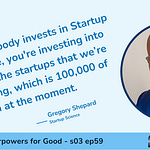Devin: What do you think of as your superpower?
Andrew: I would say that I do have some, some skills that are useful, and one of them is I have the ability, I think, to connect things in ways that make them easier for other people to understand, to be able to take, say, a story in this area and use that story to illustrate maybe a more complex or nuanced concept in another area. I think I’m a pretty good teacher.
Andrew Hill is the co-founder and CEO of BurnBright.TV, a microlearning platform for nonprofit leaders and small businesses.
“In nonprofits and small businesses, you’ve got a lot of people who have tons of passion and commitment. They’re really working to enact positive change in the world, and we want to provide them with an outstanding resource that will help them really achieve their objectives and their goals.”
BurnBright.TV features courses from content partners, including me. Two courses on the platform are mine, one on optimism and the other called “Bridging Vision to Action.” I developed the courses from my book, Superpowers for Good. As a content partner, the company granted me a coupon for my audience that gives the user three full months of free training on the platform: BBTVDEVIN21. Try it now!
While still new, the platform features dozens of excellent courses from ten different content partners. The content and contributors will multiply. If you’re interested in becoming a content partner, click here to learn more.
The idea for BurnBright.TV, explains Andrew, came from the founders doing nonprofit training together in person in the Dominican Republic. The leaders valued the content, but it was clear that by pulling people away from their work and charging fees to cover the venue, food and lodging, they had a problem. That model wouldn’t scale. The number of people they could help would always be limited by logistics. They developed a scalable model.
The need for quality training is unlimited. The best thinking, Andrew notes, evolves along with best practices.
It would be entirely possible for someone who's been working in the corporate world for 30 or 40 years to look at the current environment of diversity, inclusion and kind of shrug and say, ‘Well, you know, why do we even have to do this? We've been doing it the other way for a long time. It worked well.’ And my response is, ‘Well, I mean, society changes, expectations change, right? It's not like you were evil. What you were doing before wasn't necessarily evil. It just was what you were doing for that time and those circumstances. But now we’ve got to act differently.’ And that change, I think, is exciting.
There will always be value in getting the latest thinking of experts and successful practitioners.
Andrew says his superpower is teaching, helping people connect to the complex realities in our world. “I enjoy teaching, and I produce some of the content that we have on BurnBright.TV,” he says.
How to Develop Teaching As a Superpower
Andrew sees his unique skill as a teacher as connecting people to more complex ideas. He uses politics as an example. “The left and the right have narratives that I think in general are often highly simplistic. And the world is complicated, right? It’s actually possible—just as an example—it’s possible to love your country and want to improve your country. Right?”
Another example he uses is one of the key themes of the classic business tome by Jim Collins, Good to Great. The central idea is that a company should focus like a hedgehog on one thing. Andrew sees foxes thrive in the world, too. They don’t focus like hedgehogs but are flexible and deft as well. Such traits are also helpful in business, he says.
“I think it’s comforting certainly to have a set of rules that someone says, ‘Hey, if you do this, this is what’s going to happen.’ That’s very comforting,” Andrew says. “But unfortunately, I think it’s actually also usually false. That’s just not, I think, how the world is.”
Andrew recognizes the limitations and challenges with his thinking. He shared an anecdote to illustrate (after all, that is his superpower).
There's a famous story about Harry Truman. President Harry Truman was complaining about the advice he was getting from his economic advisers. He said to his chief of staff or something like, Can you find me a one-armed economist? Because I'm so tired of these guys saying on the one hand, on the other hand, you know, he wanted someone to just tell him what to do. And and and I am a two-armed economist kind of guy.
He recognizes that “Sometimes you’ve just got to make a decision based on the information that you have available to you, and you need to go in that direction and kind of commit and do your best to make that work.”
To develop this strength, he suggests two essential practices. The first is to listen to challenging voices. “So one piece of advice I would give is, get out there and start listening to people. Listen to people who are thoughtful, especially in areas where you think they may challenge your assumptions.”
His second point is profound. He suggests the following thought experiment. “I think no matter what you believe, you know about the world, whether it’s in a very small tactical sense or even in a global sense, like very big moral issues and moral questions. You should ask yourself if there’s information that would cause you to change your mind.”
To illustrate his point, he shared the following example:
If let's say I support the death penalty just as an example, by the way, I don't support the death penalty, just to clarify. But let's imagine that I supported the death penalty. I could ask myself, Well, is there information that would cause me to change my view of the death penalty? What information would that be? And if you can't identify that information, if you can't think of what would change your mind about it, then what you've done is you've revealed that that area is really a matter of faith for you.
These two skills, listening to contrasting voices and exploring your own beliefs, can help you become a better learner before you become a better teacher. Of course, the best teachers are great learners.
By incorporating these two essential skills into your teaching, you can make it a superpower for good.













